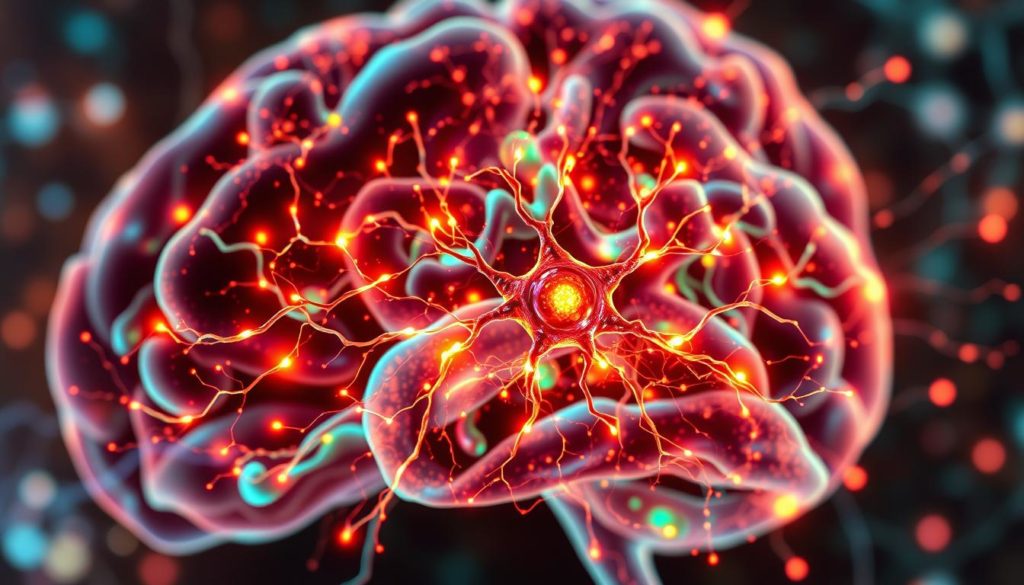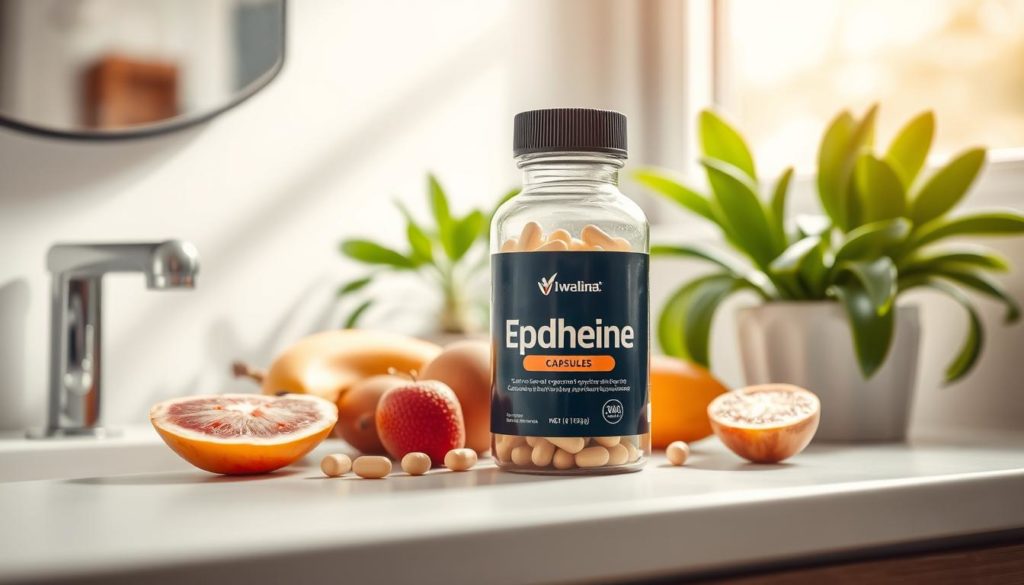Ephedrin was a popular choice for losing weight, but its use is now limited. It works as a nasal decongestant and bronchodilator too. Its safety is debated due to risks like stroke and heart attacks.
Ephedrin boosts metabolism and increases norepinephrine. This makes it strong but risky. We’ll look into its benefits, uses, and legal status in the U.S. Let’s understand its chemical nature and medical applications.
What is Ephedrin?
Ephedrin, also known as ephedrine, acts as a powerful central nervous system stimulant. It is similar to natural substances like adrenaline. This compound is essential in medicine and non-medical fields because of its properties.
Introduction to Ephedrin
Ephedrin is a part of the sympathomimetic agents group. These agents copy the body’s natural neurotransmitters and hormones. They affect nerves and muscles, causing more alertness, faster heart rate, and better airway opening.
Because it stimulates the nervous system, ephedrin helps treat asthma and blocked nose problems.

Historical Background
Ephedrin was first found in the Ephedra plant in 1885. It was used in Chinese medicine long before its global commercial use began in 1926. Today, it is widely used for its strong effects on the body, in medicine and for fun.
Chemical Composition
The ephedrine chemical structure determines how it works. It is a kind of substituted amphetamine. Specifically, it is an enantiomer of β-hydroxy-N-methylamphetamine. This structure is why it is a strong sympathomimetic agent and why it can stimulate the nervous system so effectively.
| Property | Details |
|---|---|
| Chemical Formula | C10H15NO |
| Molecular Weight | 165.23 g/mol |
| Classification | Substituted Amphetamine |
| Pharmacological Action | Central Nervous System Stimulant |
Learning about its structure helps us know how ephedrin works as a helpful agent. It also explains its ongoing research and wide usage.
Ephedrin for Weight Loss
Ephedrin has become popular for helping with weight loss. It’s a natural stimulant that boosts fat loss in different ways. It offers benefits that last both in the short term and over time. Knowing how it boosts metabolism helps us understand why it works.
Mechanism of Action
Ephedrin helps shed pounds by causing thermogenesis, which is especially effective in muscles. This makes the body produce more heat and speeds up the metabolism. It also makes you feel full longer, aiding in weight control. When used with caffeine and aspirin in an ECA stack, ephedrin is even more effective. This is why many bodybuilders choose it.

Short-term Benefits
Starting ephedrin shows quick weight loss effects. Users see a fast drop in fat and a better metabolic rate. This not only helps lose weight quickly but also keeps muscle mass intact. This is key for those who work out regularly.
Long-term Effects
The early results with ephedrin are encouraging, but its long-term benefits are still being studied. Research suggests it provides lasting weight loss benefits compared to fake treatments. It might also improve heart health by lowering bad cholesterol and raising good cholesterol. However, it’s important to weigh these benefits against the possible risks.
Here’s a breakdown of what ephedrin does for weight loss:
| Aspect | Short-term Benefits | Long-term Effects |
|---|---|---|
| Fat Loss | Rapid reduction in body fat | Continued weight loss over time |
| Metabolism | Increased basal metabolic rate | Possible sustained metabolic boost |
| Cardiovascular Health | N/A | Reduced LDL, increased HDL cholesterol levels |
Thermogenic Effects of Ephedrin
Ephedrin is known for boosting weight loss through its heat-generating abilities. It works by stimulating the central nervous system. This boosts the body’s metabolism and helps burn fat more effectively. In this section, we’ll explore how ephedrine achieves these effects.
How Ephedrin Promotes Thermogenesis
Thermogenesis is how the body produces heat, aiding in fat burning. Ephedrin causes the release of norepinephrine, a hormone. This hormone makes fat cells break down fat for energy. So, you burn calories faster, even at rest, making weight management easier.
Impact on Metabolic Rate
Ephedrine’s ability to raise the metabolic rate is one of its standout benefits. It boosts the body’s heat production, increasing the calories you burn daily. This makes it easier to lose fat and counters the slow metabolism often seen with dieting.
Studies Supporting Thermogenic Effects
Many studies confirm ephedrine’s role in boosting metabolism and fat loss. One found that ephedrine consistently led to significant weight and fat loss. Another showed it increased metabolic rates, aiding continuous fat loss. A third study found it kept metabolism up in those on very-low-calorie diets.
| Study | Findings |
|---|---|
| Study A | Increased metabolic rate by 5% |
| Study B | Enhanced fat burning by 7% |
| Study C | Prevented metabolic rate drop in low-calorie diets |
Medical Uses of Ephedrin
Ephedrin is a powerful medical sympathomimetic with many uses. It helps with different medical conditions. This medicine is known for its versatility.
Nasal Decongestant
For nasal congestion, Ephedrin is widely used. It shrinks the blood vessels in the nose, easing swelling and congestion. Some healthcare experts, though, question its effectiveness.
Bronchodilator for Asthma
Ephedrin also treats asthma well. It relaxes airway muscles, aiding asthma patients in breathing. As a medical sympathomimetic, it acts like adrenaline to quickly ease bronchospasm.
Other Medical Applications
Ephedrin has more uses besides treating nasal congestion and asthma. It treats low blood pressure during surgery. And it helps with congenital myasthenic syndrome and motion sickness sedation.
Its effects on the heart are similar to adrenaline’s. This makes it helpful in many medical treatments.
Potential Side Effects of Ephedrin
Ephedrin can be beneficial, but knowing the possible downsides is key. It’s vital to understand the health risks for safe use.
Common Side Effects
People taking Ephedrin might face some usual side effects. These include:
- Anxiety
- Headaches
- Hypertension
- Urinary retention
Serious Health Risks
Using Ephedrin can lead to more serious health issues if taken in large amounts. Risks include:
- Increased risk of stroke
- Potential heart attacks
If you have conditions like hypertension or diabetes, be very careful with Ephedrin. It’s crucial for those people to be extra cautious.
Recommended Precautions
Here are ways to use Ephedrin safely:
- Stay away from certain antidepressants and stimulants.
- Always talk to a doctor if you have existing health issues.
- Keep an eye on your health for any new problems while on Ephedrin.
- Follow the dosage and how to use it properly.
The US FDA has reports of Ephedrin causing problems. Always be careful and use it under a doctor’s watch.
Ephedra Extract vs. Ephedrin
At first glance, Ephedra Sinica and ephedrin may seem similar. But, they are quite different. Ephedra Sinica, also known as Ma Huang, is a traditional Chinese herb with a rich history. Ephedrin, on the other hand, is the main active ingredient from this plant.
Differences in Composition
Ma Huang, or Ephedra Sinica, is made up of several alkaloids. These include ephedrine, pseudoephedrine, and others. It’s a natural ingredient for dietary supplements and is less refined. This means it offers a range of effects and benefits. Ephedrin, however, is just the purified ephedrine alkaloid. It’s used in medicines and for enhancing performance, with strict regulation.
Effectiveness Comparison
The benefits of Ephedra Sinica and ephedrin for weight loss and thermogenesis are well-researched. Both can raise metabolic rates and help with fat loss. Yet, ephedrin is often chosen for its stronger effects in pharmaceutical uses. But, Ma Huang is valued in holistic health for its gentle and balanced approach.
| Aspect | Ephedra Sinica | Ephedrin |
|---|---|---|
| Composition | Multiple alkaloids (ephedrine, pseudoephedrine, etc.) | Pure ephedrine alkaloid |
| Uses | Traditional medicine, dietary supplements | Pharmaceuticals, controlled substances |
| Regulation | Dietary supplement ingredient, FDA regulated | Strictly regulated, banned in some uses |
| Effectiveness | Moderate, varied effects | Highly potent, specific effects |
| Safety | Considered safer in natural form with combined alkaloids | Higher risk of side effects due to purity and potency |
Safety Considerations
Safety is crucial when looking at Ma Huang and ephedrin. Both have their risks, especially if used wrongly. The FDA banned ephedrin in products due to serious side effects like hypertension and strokes. Yet, Ephedra Sinica remains legal as a supplement ingredient, with tight rules to prevent misuse.
Legal Status of Ephedrin in the United States
In the United States, ephedrine legality is complex due to both federal and state regulations. This substance is available by prescription and in some over-the-counter products. However, it is strictly regulated to prevent misuse.
Since 2004, the FDA has put a ban on dietary supplements containing ephedrine alkaloids. This is because of the serious health risks they pose, like heart attacks and strokes. The FDA’s strict control shows how ephedrine can be harmful if misused, despite its benefits.
State laws also regulate ephedrine, with different rules on dosage and sales. These regulations help reduce health risks and prevent misuse. It shows ephedrine’s dual nature: it can be helpful or harmful based on its use.
Ephedrine legality in the U.S. involves understanding both federal FDA regulations and state laws. This legal framework aims to ensure public safety while allowing for its medical use.
Alternatives to Ephedrin for Weight Loss
Due to legal and health worries about ephedrin, many people are looking for other ways to lose weight. There are options beyond ephedrine supplements that are safer. With a mix of lifestyle changes and scientifically supported supplements, effective weight loss is possible. This approach steers clear of the dangers tied to ephedrine products.
Non-ephedrine Supplements
There are safe supplements out there that don’t contain ephedrine. Ingredients like green tea extract, Garcinia Cambogia, and CLA help with weight loss. They boost your metabolism healthily. It’s best to choose supplements with scientific support for better and safer results.
Lifestyle and Dietary Changes
Making changes in your lifestyle and diet is key for lasting weight loss.
- Engaging in regular physical activity, such as aerobic exercises and strength training.
- Maintaining a balanced, calorie-controlled diet rich in vegetables, fruits, whole grains, and lean proteins.
- Staying adequately hydrated to support overall health and metabolism.
Professional Medical Advice
It’s smart to seek advice from a healthcare professional for weight loss. Doctors and dietitians can craft plans just for you. They’ll ensure your weight loss is not only successful but also safe.
| Alternative | Benefits | Considerations |
|---|---|---|
| Green Tea Extract | Boosts metabolism, aids fat burning | Check for caffeine content |
| Garcinia Cambogia | Suppresses appetite, blocks fat production | Consult a doctor for safe use |
| CLA (Conjugated Linoleic Acid) | Promotes fat loss, supports muscle retention | Ensure it’s used alongside a balanced diet |
Public Opinion and Regulatory Actions
Public opinion on ephedrine supplements has changed a lot. People are now aware of both its weight-loss benefits and safety concerns. Evidence has shown it can increase blood pressure and heart rate, and cause serious problems like strokes and heart attacks. This awareness has made consumers more careful and critical of the supplement industry.
The FDA’s ban on ephedrine-containing supplements was a big deal. It was based on reports of bad reactions and scientific studies. These studies showed the risks were much higher than any small benefits. This ban showed we need to be more cautious about using supplements.
The supplement industry is now focusing more on making sure their products are safe and work well. There’s still a lot of debate about banning certain items and checking other similar substances. But as people want safer options, the industry is trying to be more open and based on solid research.
FAQ
What is Ephedrin?
Ephedrin is known as ephedrine too. It’s a stimulant that affects the central nervous system. It’s used in medical settings to avoid low blood pressure during surgeries and to treat asthma, obesity, and narcolepsy. It comes from the Ephedra plant. Its action is similar to that of certain hormones and neurotransmitters on nerves and muscles.
How does Ephedrin promote weight loss?
Ephedrin helps with weight loss by inducing thermogenesis. This process increases your metabolic rate. It boosts fat burning by raising norepinephrine in your body and activating certain receptors. So, you burn more calories even when resting. This makes it an effective tool for weight loss if used right.
What are the thermogenic effects of Ephedrin?
Ephedrin’s thermogenic effects increase your body’s metabolic rate and calorie burning. It does this by causing heat production inside the body. Studies have shown it’s effective at raising metabolic rate and helping with fat loss.
Can Ephedrin be used as a nasal decongestant?
While Ephedrin stimulates the sympathetic nervous system, it’s not the first choice as a nasal decongestant. There are more effective options available for this purpose. Its use as a decongestant is subject to debate.
Is Ephedrin effective as a bronchodilator for asthma?
Yes, Ephedrin serves as a bronchodilator. It helps relieve asthma by opening up the airways. This makes breathing easier. It is used in various settings for this reason.
What are the common side effects of Ephedrin?
Ephedrin can cause anxiety, insomnia, headaches, high blood pressure, and urinary retention. The side effects vary in severity. Long-term use can lead to more serious problems like stroke and heart attack.
What are the serious health risks associated with Ephedrin?
The serious risks include a higher chance of having a stroke or a heart attack. Therefore, it’s important for users to stick to the recommended doses. They should also avoid combining it with certain other stimulants or medications.
Are there differences between Ephedra extract and Ephedrin?
Ephedra extract and Ephedrin have the same active component, ephedrine, but they differ in their makeup and concentration levels. Ephedra comes from the whole plant, while Ephedrin is a purified compound. There’s a difference in safety and effectiveness between them.
What is the legal status of Ephedrin in the United States?
In the United States, Ephedrin can be prescribed or bought over the counter. However, the FDA banned ephedrine-containing supplements in 2004 due to safety issues. Today, its sale and use are strictly controlled to reduce health risks.
What are some alternatives to Ephedrin for weight loss?
For weight loss, alternatives to Ephedrin include supplements without ephedrine, diet changes, and seeking medical advice. A good approach combines a low-calorie diet, regular exercise, and clinically-backed supplements. All these should be done with a healthcare professional’s guidance.
How has public opinion and regulatory action affected Ephedrin use?
Public opinion on Ephedrin has been shaped by its benefits and safety concerns. Regulatory steps, like the FDA’s ban, were based on side-effect reports and reassessing risks and benefits. These actions and growing awareness have influenced the ephedrine product market and consumer demand.


